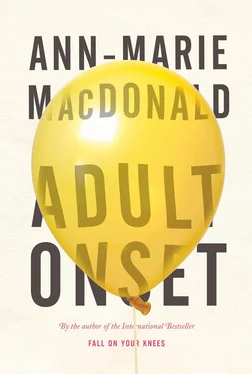She kisses Matthew on the forehead. “Good night, sweetie pie.”
“G’night, Mumma.” His words are muffled by his thumb as he slips it into his mouth. He is only five. There will be time enough to worry about orthodontics and oral fixations later. He has every right to self-soothe.
She winds his glass unicorn and it tinkles his favourite tune. It was her first gift to him, and he keeps it on his windowsill where it prisms the light each morning.
She slips into Maggie’s room and sees she is asleep, baby brows furrowed, sucking intently on a soother. She reaches down to stroke her back, but the child pulls away.
She sighs.
Is it that Maggie is a girl? That isn’t supposed to be a problem for card-carrying feminists. From the start, Mary Rose was aware of a gap between her and her daughter; lapses on her own part that no one ever saw and which would never be termed “neglect.” Her gaze for Matthew was glued, unbroken, she fed on the sight of her child and he was securely tethered, brave in that beam. Then there was Maggie. Crying inconsolably in her arms. Angrily. She cried whether Mary Rose picked her up or not. Whether she stroked her, fed her, changed her, rocked her, bounced … Everyone talks about that magic “baby smell.” Matthew had it and so, supposedly, did Maggie, but not for Mary Rose. Sometimes — and this is chilling — she even forgot Maggie was there. Perhaps deep down she really is jealous of Hil for having borne a child — even so, Mary Rose is convinced that what was a soul-shifting miracle for Hil would have been, for her, annihilation. Mind the gap .
She waited for it to close, come together and heal like an incision. But with time, absence took on substance. A layer formed like a soapy film, then hardened into Plexiglas: My baby doesn’t like me .
Maggie would look at her as though she knew something about her — something Mary Rose thought she had outrun long ago. She knew this was crazy, and over and over she reached for the love she was supposed to feel, the love she could see. It was like the illustration in her childhood book of fairy tales: Snow White unconscious within her glass coffin, beautiful, unreachable, a bite of poisoned apple lodged between her lips. Time and again Mary Rose reached, and time and again her hand struck glass.
She leaves Maggie’s room and bats away the balloon that has drifted from Matthew’s. It makes its wan way down the hall like an aimless ghost, yellow head at a vacant tilt, the tinkly tune of the unicorn trailing behind, plaintive and sweet, “Where Have All the Flowers Gone?” She rubs her arm — dull patch of soreness, seems worse at night.
She goes to the living room, intending to find a nice cozy murder mystery on the bookshelf, but bends to remove the expandable bumper from the coffee table. It is ugly and it is overkill and it did not prevent her child from playing with scissors. Mary Rose, like the entire baby boom generation, grew up with unpadded coffee tables and survived; no one “childproofed” in those days. She recalls the gleaming coffee table in the living room of the apartment in Germany — her first home. She can see it plainly, in black-and-white, as though in an old photograph. Like the one her father took at Alexander’s grave. In it she stands next to her sister and in front of her mother. Her hair is in a little bun, her mother’s hand rests on her shoulder, protective, reassuring, holding in place her sweater as though Dolly had just now removed it from her own shoulders and placed it warm around her child.
And perhaps this is why Mary Rose returned to the picture over and over again — not merely for the morbid frisson that spawned an entire literary career, but because it was evidence that her mother could be gentle. Attentive. Are you cold, Mary Rose? Even though the photo was a stock image from her childhood, it is only now that she tries to imagine standing as an adult at her baby’s grave with Hilary. And taking a picture, because they know that soon they will be moving far away and will not be able to visit that grave again for many years … Maureen is right, the dates would be in the photo.
What will become of all the old black-and-white and Kodacolor snapshots when her parents have died and she too is gone along with her siblings and their children’s children? They will be sold in bulk at an estate auction and turned into ironic greeting cards. Or merely incinerated.
Her mother’s difficulty with before-and-after, cause-and-effect — a species of temporal dyslexia that blighted Mary Rose’s own early school career — perhaps it runs in the family, like bone cysts. See Jane run! For that matter, when exactly was Other Mary Rose born? And what did they do with her body? It was certainly not put in the ground beneath a stone.
Mary Rose bends back down and re-fits the hideous padded bumper. Coffee tables can be lethal.
•
She gets up.
She gets up.
She gets up.
•
Mary Rose is changing the biodegradable bag in the recycling bin when Hil calls and asks, “How’s your arm feeling?”
“My arm? It’s fine, why?”
“You went to the doctor.”
“That was last fall I saw the orthopaedic guy.”
“Oh, what was today’s appointment?”
“It was just … routine.”
“What kind of routine?”
“Fibroids, okay?” She hates even saying the word, sodden as it is with female troubles . “They’re shrinking, I’ve killed them, it’s done.”
“Okay.”
“How’re rehearsals going?”
“Well, we’re previewing in two nights.”
“Oh wow, great.” Mary Rose finds a pen in the telephone drawer and makes ready to jot it in the Thursday box on the foot calendar. “So the fifth.”
“That’s Friday.”
“Oh, okay, Friday.”
“Yup.”
Mary Rose jots it in the Friday, April 6 calendar square: Hil 1st public preview . Hil is getting ahead of herself as she always does when stressed, thinking she’ll be previewing two nights from now on Thursday when in reality it’s in three nights. “Previews don’t usually start on a Friday.”
“No, they don’t. Are you okay?” asks Hil.
“Yes, do I sound not-okay?”
“I just wonder if you’re in pain.”
“I’m fine, can we not talk about my uterus?”
Hil doesn’t laugh. Oh no. Is she going to start crying? Does she want another baby? Is she having an affair?
“Hil? Are you okay?”
“I’m fine, I’m lonely.”
“Maggie dived right at my head in swim class today, it was hilarious …” She tells her about the swimming lesson. About Daisy’s postal parole and Maggie kicking off her boots in the park — but not about the altercation on the stairs. About Matthew’s flying whale. “The kids are so lucky to have you, so is Daisy. I miss you.”
She hears in the silence that Hil is indeed crying. Mary Rose envies it somewhat, this ability to turn on the waterworks and get some relief and sympathy. She could use some time at the Emergency Eyewash Station herself — maybe she would sleep better.
“I wish I could see your show, love. I know it’s going to be amazing.” She speaks in Lady Bracknell’s voice. “ ‘To lose one child may be regarded as a misfortune. To lose two looks like carelessness.’ ”
“That’s not the line.”
“Yes it is, it’s my favourite line.”
“Yes, but that’s not the line. It’s ‘parent,’ not ‘child’—‘to lose one parent.’ ”
“Are you sure?”
“Mary Rose. I’m doing the play.”
•
Mary Rose is dangling by her wrists over the balcony. It is a sunny day. She can feel the bars of the railing at her back. Three storeys below, on the lawn of the apartment building, their father is playing catch with another man. Both are in white dress shirts open at the neck, their sleeves rolled up. She watches the ball arcing back and forth between them. She knows if her father looks up and sees her, she will fall. Where is Mummy?
Читать дальше












